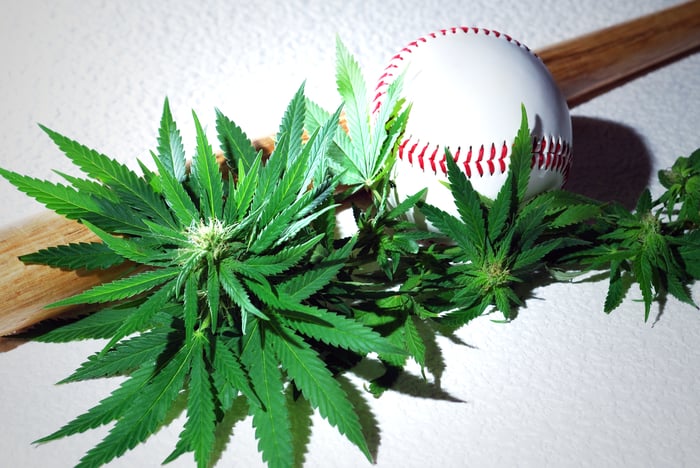In just 10 days we'll be ringing in a new year and a new decade, but it may not be the happiest of times for marijuana stock investors. That's because, to put things plainly, the North American cannabis industry has had an awful year.
When 2019 began, it looked as if pot stocks would pick up right where they'd left off the previous couple of years and significantly outperform the broader market. We did, in fact, see more than a dozen cannabis stocks gain in excess of 70% just in the first quarter.
However, the performance of cannabis stocks since the end of March has been abysmal, with many losing a double-digit percentage and underperforming the S&P 500 by 40 or more percentage points for the year. Pretty much everything that could go wrong has gone wrong for the North American pot industry.

Image source: Getty Images.
What can go wrong did go wrong
To our north, Canada has been contending with unrelenting supply issues derived from two sources. First, there's regulatory agency Health Canada, which has struggled to work through a backlog of cultivation, processing, and sales license applications that totaled more than 800 when the year began. Even with a midyear change to the cultivation license application qualifications, it's going to take some time before the agency is able to work through this backlog. For time being, this means potentially long wait times before growers are given the OK to plant, process, or sell marijuana.
The second Canadian issue relates to Ontario's slow-stepped rollout of a physical retail footprint. Canada's most populated province had been relying on a lottery system to award retail stores, but this resulted in a mere 24 being open a full year after sales commenced in the country. With only one dispensary per 604,000 people in Ontario, the black market has thrived.
Meanwhile, high taxes rates are taking their toll in the United States. California continues to shake the change out of consumers' pockets by levying a state and local tax, 15% excise tax, and wholesale tax on recreational cannabis sales. And, mind you, this tax rate is going up on Jan. 1, 2020, and doesn't include other expenses, such as laboratory testing, that you can rest assured are being factored into the final cost of the product.
The point is, illicit producers are having a field day throughout much of North America at marijuana stock investors' expense in 2019.

Image source: Getty Images.
This good news is a diamond in the rough
However, following a long period of negative events, a positive news story that's bound to create some buzz was announced 10 days ago.
On Dec. 12, Major League Baseball (MLB) and the Major League Baseball Players Association (MLBPA) announced changes to the league's drug policy. MLB and MLBPA agreed to remove marijuana from the list of banned substances in an effort to better align the league with changing policies at the state level. As a reminder, 33 states have passed legislation legalizing medical marijuana, with 11 states also allowing adult-use consumption.
As the press release notes, all forms of natural cannabinoids will be allowed, which includes marijuana and its derivative cannabinoids, tetrahydrocannabinol (THC) and cannabidiol (CBD). THC is the cannabinoid known for getting users high, whereas CBD is the nonpsychoactive cannabinoid that offers perceived medical benefits. Per the release,
Natural Cannabinoids (e.g., THC, CBD, and Marijuana) will be removed from the Program's list of Drugs of Abuse. Going forward, marijuana-related conduct will be treated the same as alcohol-related conduct under the Parties' Joint Treatment Program for Alcohol-Related and Off-Field Violent Conduct, which provides for mandatory evaluation, voluntary treatment, and the possibility of discipline by a Player's Club or the Commissioner's Office in response to certain conduct involving Natural Cannabinoids.

Image source: Getty Images.
On the other hand, MLB and MLBPA announced that the league will now be testing for opioids, fentanyl, cocaine, and synthetic cannabinoids. Opioid abuse has been deemed an epidemic in the U.S., and this policy change looks to be representative of that shift in how this class of pain meds is now viewed.
Interestingly, while MLB's policy shift is a home run for the cannabis industry in the PR department, it's unlikely that other major sports will follow its lead anytime soon. The National Football League has stood pat on its policy that marijuana remains an illegal substance, albeit the league is examining medical marijuana as a possible pain management tool. Meanwhile, the U.S. Professional Golfers Association of America (PGA) warned its players earlier this year that they take on risk by consuming CBD products which may be "contaminated with higher levels of THC than claimed on the label." THC remains a completely illegal substance on the PGA Tour.
Marijuana momentum continues, but not at the federal level
If anything, this policy change from MLB does highlight both the ongoing shift in opinion toward cannabis, and the role marijuana and its cannabinoids could play in treating patients.
As for the former, Gallup's national survey showed that an all-time high 66% of Americans favor the idea of legalizing cannabis in 2019. A separate poll from the independent Quinnipiac University in 2018 found that roughly 9 in 10 Americans believes physicians should be able to prescribe marijuana to their patients.

Image source: GW Pharmaceuticals.
When it comes to marijuana's medical status, all the evidence needed on this topic was provided by GW Pharmaceuticals (GWPH) and its potential blockbuster drug Epidiolex. This CBD-based oral drug became the first cannabis-derived therapy to be approved by the U.S. Food and Drug Administration in June 2018. GW Pharmaceuticals' lead drug wound up reducing seizure frequency in patients with two rare types of childhood-onset epilepsy by between 30% and 40% from baseline. Although Schedule I drugs aren't recognized as having any medical benefits, GW Pharmaceuticals' lead drug shows otherwise.
Nevertheless, MLB changing its drug policy isn't going to matter one iota when it comes to the federal classification of cannabis. Lawmakers on Capitol Hill remain entrenched in their views and are unlikely to vote in favor of reform anytime soon, even with the American public offering a favorable take on marijuana. Plus, with Mitch McConnell (R-Ky.) operating as Senate Majority Leader and being unwilling to allow any cannabis reform legislation to reach the Senate floor for vote, all efforts to reschedule or deschedule marijuana in the U.S. are liable to come up short for potentially years to come.
In a year where pot stocks have been pummeled, cannabinoid-focused drug developers can take solace in at least one minor victory.





